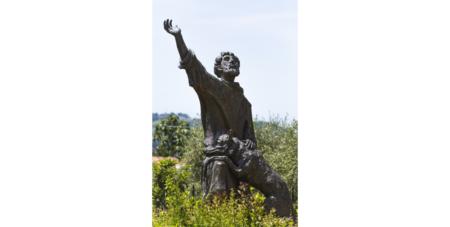'Laudato Si': Protecting 'Our Common Home' and the dignity of the poor
I welcome with joy and gratitude the encyclical letter, "Laudato Si'" ("Praise be to You") on the urgent human, moral and religious issue of the environment. The first pope to take the name of Francis opens the letter with a phrase from St. Francis of Assisi whose spirit and vision is evident throughout the encyclical.
The Holy Father has given us a powerful, careful, prayerful analysis of two great ideas. The first idea, "Our Common Home," the phrase he uses to describe the environment; the "home" for the human family is in severe danger and needs immediate protection and healing at the global, national and local levels of life. The second idea is that while the threatened state of the environment is a universal challenge affecting us all, those most in danger in the present and future are those already poor and vulnerable, within states and across the globe.
This constant linkage throughout the encyclical of the dual need to respect and protect "Our Common Home" and the need to respect and protect the dignity and lives of the poor may be regarded as the distinctive characteristic of this powerful message of Pope Francis. Both of these themes have been evident since the beginning of Pope Francis's pontificate but this letter joins them with new depth and specificity.
"Laudato Si'" is permeated by a sense of human, moral and religious urgency, but the Pope recognizes the factual complexity of the joining of the environment and poverty. He states his case this way: "We are not faced with two separate crises, one environmental and the other social but rather with one complex crisis which is both social and environmental" (#139). In preparing the encyclical the Holy Father has consulted broadly in the scientific community, convinced, as he says, that the challenge facing "Our Common Home" provides a moment when religion and science can be joined in a crucial partnership.
The encyclical letter provides an overview of the specific issues which are well known in secular discussions of the environment: climate changes, shortages of safe clean water, the economic impact of choices made to address environmental threats and the need for wise and courageous political choices nationally and globally.
The letter is the voice of a pastor and teacher who leads a universal church across regions, cultures and nations. Pope Francis draws deeply on the Hebrew and Christian Scriptures and the Catholic social tradition as he develops the religious and moral foundation of his message. He relies heavily on the teaching of his immediate predecessors in the papacy; beginning with John XXII though Paul VI and particularly St. John Paul II and Benedict XVI. Chapter Two of the encyclical "The Gospel of Creation" draws deeply and broadly from biblical and theological scholarship to stress the specific meaning the environmental challenge is for Catholics. But the letter in the Pope's mind has a broader audience. He states his intention at the outset to enter into the diverse global dialogue already underway about the threats to "Our Common Home." He offers this letter as a contribution to the global conversation. He acknowledges with gratitude the resources other religious communities and traditions have made to the conversation, and he explicitly states that while many participants addressing the environment do not hold a religious perspective, he invites consideration of what religious vision and tradition can offer.
When Pope Francis turns to the moral dimensions of the environment and poverty, his themes are solidly grounded in the Catholic tradition of social teaching. Familiar Catholic themes of social justice, the option for the poor and the demands of the common good permeate the letter. The Holy Father adds a distinctive note to these in his call for an "integral ecology" seeking to bring the traditional ideas to confront the authentically new challenges posed by the environment and poverty.
"Laudato Si'" is a teaching document to be sure; but it is also a call for action at every level of our common life. In the final two chapters of the letter, Pope Francis highlights some of the choices which face individuals, states and international institutions if the twin problems of protecting the environment and honoring the equal dignity of all are to be faced effectively.
This encyclical, appearing still early in a new century, is designed to have a long shelf-life. The problems it analyzes are both urgent and complex; the responses to these must begin now, but will take time to come to fruition. I commend the letter to audiences inside and beyond the Catholic community and I pray for its reception and effective implementation.
- Cardinal Seán P. O'Malley, OFM Cap. Is Archbishop of Boston



















